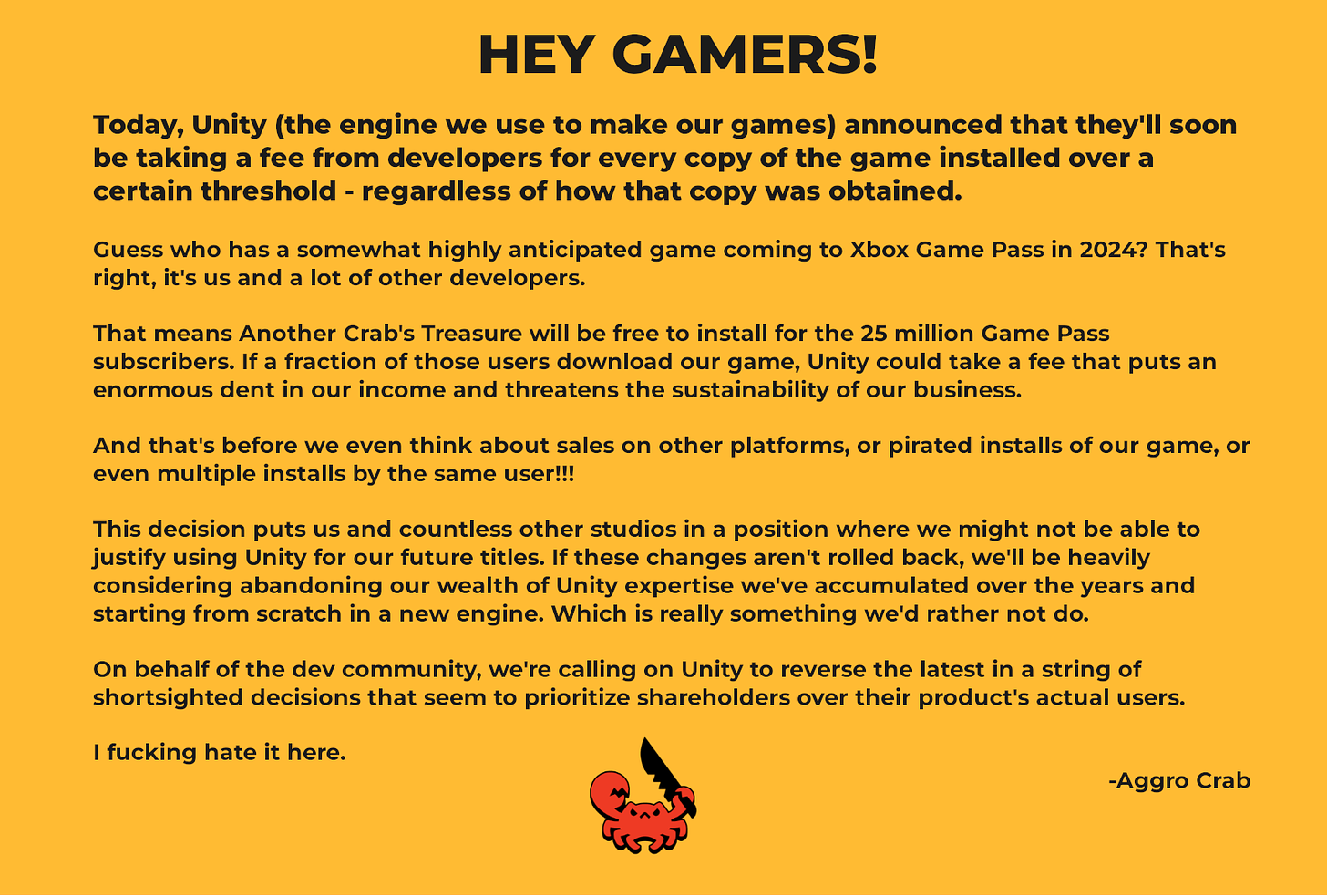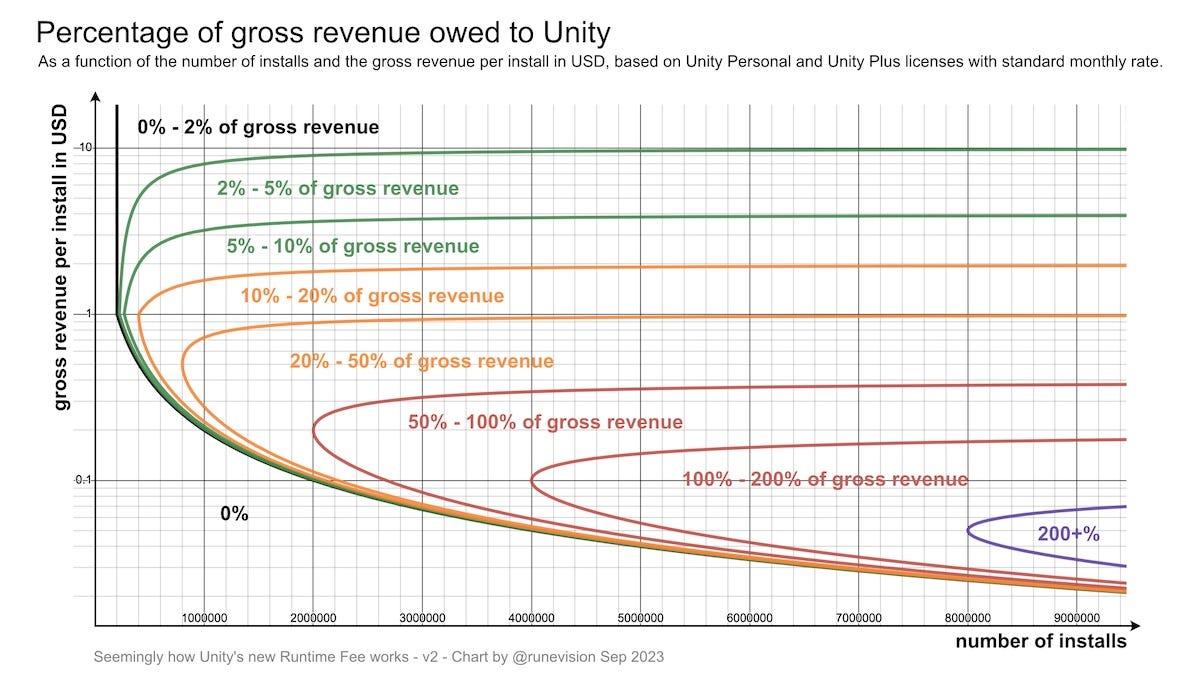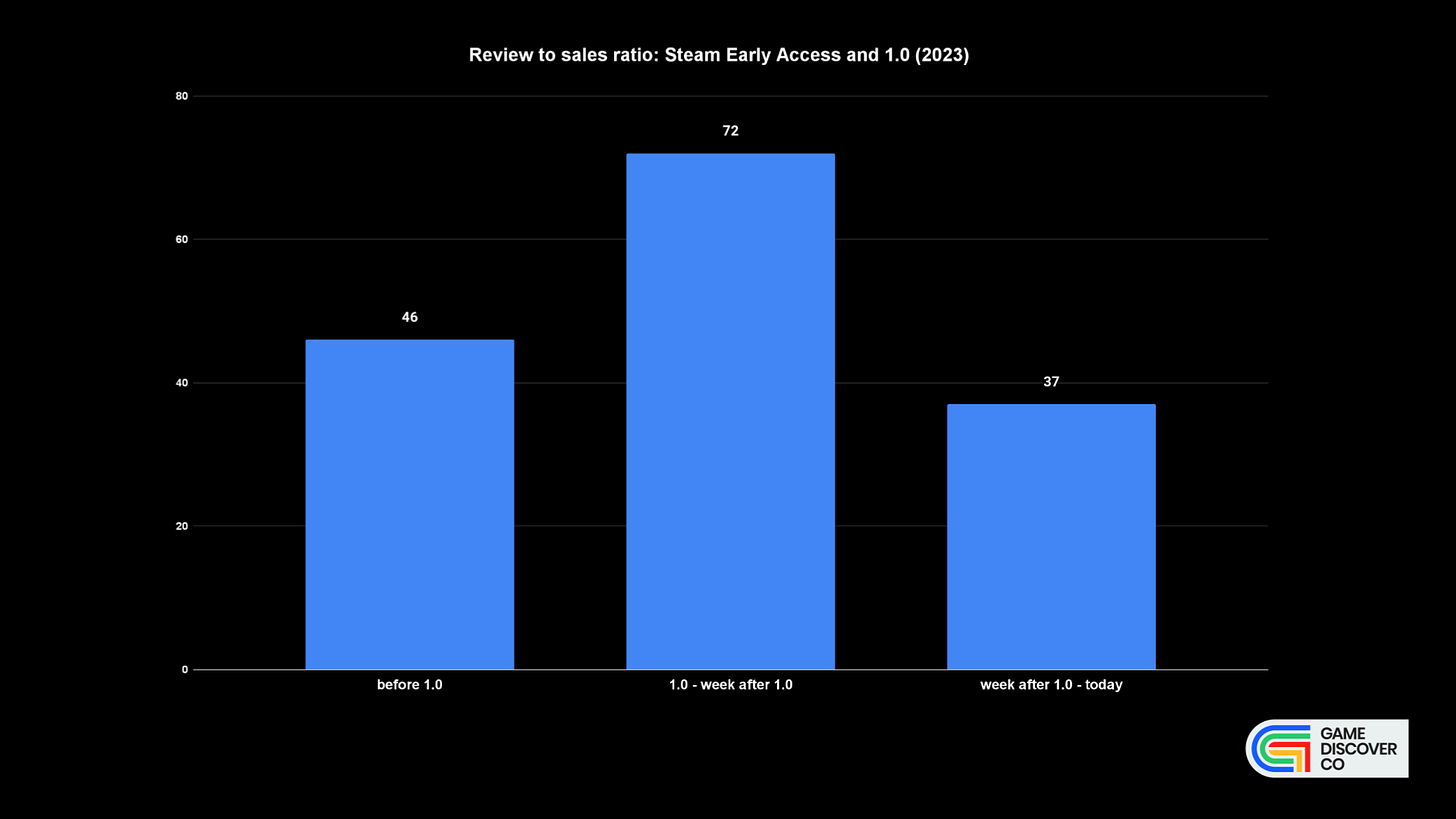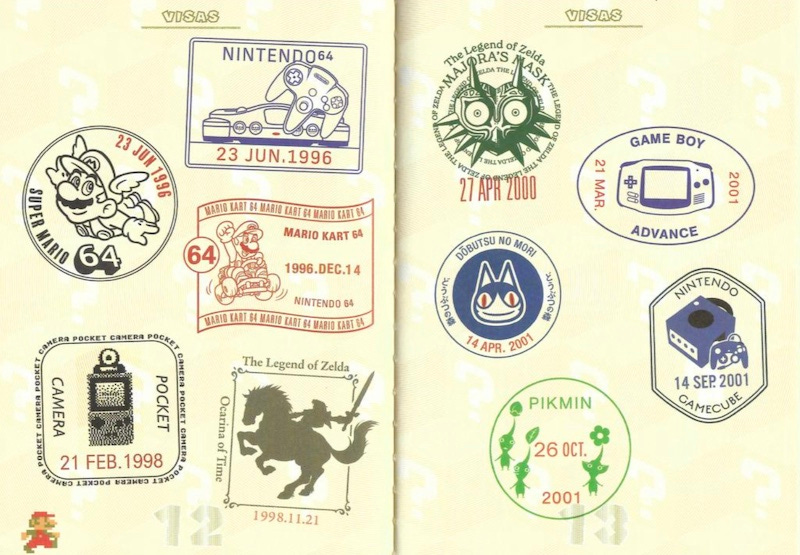Unity changes: why PC & console devs feel like the 'ugly duckling'
Publikováno: 13.9.2023
Also: Early Access transitions and Steam reviews.
[The GameDiscoverCo game discovery newsletter is written by ‘how people find your game’ expert & company founder Simon Carless, and is a regular look at how people discover and buy video games in the 2020s.]
Well, it’s been… is it only Wednesday? How can it possibly be only Wednesday? For folks in the game industry, it’s fair to say this week has been ‘a thing’, right? And we’re only halfway through it.
Anyhow, we’re starting off - as you might expect - with a look at Unity’s game engine license changes. We’re trying to peel back the layers a little to ask - what’s really happening, and why are devs - correctly - so upset? That starts… now.
[PSA: our upgraded Plus data suite soft-launched, and you can subscribe to Plus now to get full access to it, weekly PC/console sales research, an exclusive Discord, three detailed game discovery eBooks - & lots more. We’re excited, but more of the roll-out is coming soon…]
Unity: PC & console devs as the 'ugly duckling'?

Unless you’ve not checked the Internet in the past 24 hours, you’ll probably be aware that dominant PC/console game engine Unity (there are 38,000 Unity engine games on Steam, vs. 10,000 for Unreal) announced an upcoming new pricing model based on ‘number of installs of your game’, and all hell has broken loose.
While GameDiscoverCo covers game ‘discovery’ and platforms, and not engines, you may not be surprised to hear that Unity’s proposed pricing structure overlaps into a lot of business model and platform questions!
This is a fast-moving and complex issue. But here’s some insight on why we think this ‘solution’ was proposed, and why it very much isn’t working for Unity’s customers:
Unity wants a semi-trackable solution for better monetizing its top (mainly mobile) customers: so, how to approach? Although a percentage of dev revenue is more logical for engine licensing (as Unreal Engine’s ‘5% of gross over $1 million’ fee is), it works completely on the ‘honors system’ - Epic has no way of knowing your revenue. But download numbers can be tracked. That’s how this started.
The PC/console engine business is surprisingly unimportant - fiscally - to Unity: looking at the company’s latest quarterly financials, Create Solutions (engine division) was $193 million, compared to Grow Solutions (mobile ads/mediation) of $340 million. And "Industries (beyond games) represent 30% of the total Create Solutions revenue". So engine revenue for games is ‘only’ 23% of Unity’s revenue, and PC/console presumably half or less of that - 10% or a bit more.
As the post-COVID game/tech stock bubble died, Unity got hammered: the company’s share price, which topped out at $196 in November 2021, is now $36 and dropping. It still has a market cap of $14 billion (!), but there’s a lot of pressure for it to reach actual profitability. Engine fees is an obvious angle of attack.
So, as one indie dev joked on Twitter: “Unity, we know you just want the Genshin Impact money, you can just go out and say that. I don’t have that money. Don’t try to take it from me.” And this is the problem, when a company has such a broad base of customers!
While mobile game publishers & devs are extremely unhappy about this too, there are some stealthy provisos in the deal - around using Unity’s mobile ads and ad mediation platforms - that may well reduce or remove the fees for them. As Matej Lancaric noted: “I guess [Subway Surfers publisher] Sybo is lucky to use Unity as mediation since they can waive the fee because of the LevelPlay credits, but what about others?”
Unity would say - ‘come and use LevelPlay, we’ll wipe those fees out!’ (Sigh.) The problem here - besides the blackmail-adjacent nature of that clause - is that PC and console engine users have no ability to use that. Hence the ‘ugly duckling’ headline on this newsletter.
And if even the mobile publishers/devs are feeling betrayed, PC and console devs are even more so. Nobody has ever considered per-download fees on game engine use. It adds stress and uncertainty to what is already a stressful and complex business.
What’s more, there are use cases where you have reason to worry. For example, Aggro Crab (Another Crab’s Treasure) put this statement out yesterday:
Now, since then, Unity ‘clarified’ to Axios’ Stephen Totilo that “developers like Aggro Crab would not be on the hook, as the fees are charged to distributors, which in the Game Pass example would be Microsoft.” (And also that “the company would actually only charge for an initial installation”, not redownloads.)
At which point, we can imagine the scene within Xbox HQ trying to work out a) what the costs are b) if they need to just ‘eat’ them c) how they would set up reporting & billing, if they didn’t. And how on earth does Unity work out who - and how - to bill in this situation? Will developers be passing their engine fee bills to their platforms?
There’s a lot more ‘what if?’ issues. Many of them have been handwaved away by Unity, such as charity game bundles generating dev fees (they’ll exempt it?), and according to Unity mediator Totilo: “Unity "regrouped" and now says ONLY the initial installation of a game triggers a fee… demos mostly won't trigger fees.” There’s also the issue of pirate installs - likely way more common on PC/console than mobile.
And it’s not just a PC/console problem - we’ve also seen edge cases in mobile: “Our studio focuses in mobile games for kids. We don't display advertising to kids because we are against it (and we don't f***ing want to), our only way to monetize those games is through In-App purchases. We should be in charge to decide how and how much to monetize our users, not Unity. According our last year numbers, if we were in 2024 we would owe Unity 109% of our revenue.”
So, when you start to get devs drawing insanely complex graphs like this, you know that your pricing model has too much uncertainty in it for many:
Obviously, a lot of regular Unity employees are appalled by the situation. There’s an anonymous post by an (alleged) Unity staffer (archived link) on their forums which makes his/her view of the situation explicit: “We lovecelebrating your successes with the Unity engine and many of us are up in arms internally about all this… all of the concerns that are understandably blowing up at the moment have been raised internally by many weeks before this announcement.”
This person also makes explicit the ‘Genshin Impact’ point made earlier - some “very profitable game studios pay very little to Unity compared to their other costs of business”, and “The price changes are aimed at this ~10% of customers as a way to scale their costs with success via revenue+installs.”
This approach is way more understandable - though maybe not palatable - when you are a mobile game biz with regular per-user UA (user acquisition) costs. (Especially with cost defrayable via, ugh, using some of Unity’s other services.) Many PC/console devs have had organic success, so the idea of a per-user fee seems outlandish.
And ultimately, this is about trust. As a game creator, you have a deep relationship with your engine provider, because you’re locked into it. Perhaps most small and medium PC & console devs won’t be affected significantly by these biz model changes - and we suspect this might be true. But the fact you could be, in unexpected ways that are untrackable or uncontrollable by you - is mentally untenable.
Let’s try an analogy or two. Imagine if your car mechanic suddenly started charging you based on the number of miles your car has driven, not what was broken? Or if your psychiatrist started charging for the number of times you got emotional during the counseling session, not by the hour? But you couldn’t quickly change provider...
How would you feel? Probably a bit like Rust and Garry’s Mod creator Garry Newman, who wrote the ever-eloquently named blog post ‘Unity can get f*cked’:
“Let me be clear.. the cost isn't a big issue to us. If everything worked out, the tracking was flawless and it was 10p per sale, no biggy really. If that's what it costs, then that's what it costs. But that's notwhy we're furious. It hurts because we didn't agree to this. We used the engine because you pay up front and then ship your product. We weren't told this was going to happen. We weren't warned. We weren't consulted.
We have spent 10 years making Rust on Unity's engine. We've paid them every year. And now they changed the rules... Unity has shown its power. We can see what they can and are willing to do. You can't un-ring that bell.”
What did people expect? You can, indeed, find Unity CEO John Riccitiello cheerfully saying back in 2015: “I do think you could argue that royalties are quite a bit like free-to-play. They sort of hook you and then try to exploit that relationship. That's not what we're trying to do. If you were to walk around Unity, you'll find this point about transparency, clarity... democracy is like every other paragraph of every other conversation.”
So what changed for him? Well, if you run a large public company like Unity, you can’t truly have a personal view that’s permanently a company view, like Epic’s Tim Sweeney. Your opinions are dictated by the share price, and shareholders. (A brief pause for everyone to hate on capitalism is necessary here.)
And if the shareholders say you’re not doing good enough, your view… changes. And your customer’s view of Unity changes as a result of that - in this case very much for the worse, especially since there were already complaints about retroactive Terms Of Service changes that Unity claimed to address in 2019.
As for where this is all heading? No idea. But we hope it ends in a much more conventional, measure-able deal for PC and console game creators.
Steam 1.0 launch: more reviews per player, or less?
You may be aware that Chris at HowToMarketAGame has been doing some neat research on Steam Early Access, trying to work out if it’s advantageous to do it. (He thinks it is, if you can get 200 reviews in your first month of Early Access.)
As part of this, we were chatting about what happens when your game hits 1.0 on Steam and gets a review spike. Do you get more reviews per copy sold as you reach 1.0, because all your Early Access players leave reviews as soon as the game ‘launches’?
This was an impression some people have, so we ran this by our GameDiscoverCo Data Fellow, Strahinja, to see if he could prove or disprove it with data. Here’s what he came up with:
“Since I needed [sales] rank history for this, I could only consider games that came out our Steam Early Access in 2023. I also only used games that have > 500 reviews, so the sample isn't the largest (about 50 games).
It seems that during the Steam 1.0 launch, a lot of copies are sold, and those new players don't write reviews straight away, so the reviews to sales ratio is higher. Some time after that [possibly prompted by Steam’s reminder to review?] , those new players write reviews, so then the sales/reviews ratio gets a little lower.”
So what we can see - above - is that "Before 1.0", there were 46 Steam copies sold per review, then at "1.0 - week after 1.0", there were 72 copies sold per review. But the"Week after 1.0 - today", there were 37 copies sold per review.
So we couldn’t find evidence that players “generally wait for 1.0 to write a review” - though some doubtless do. And in fact, if you look at a Steam game’s reviews for the week of its 1.0 launch to gauge its success, there may have been more copies sold than you ‘think’. Interesting, huh?
The game discovery news round-up..
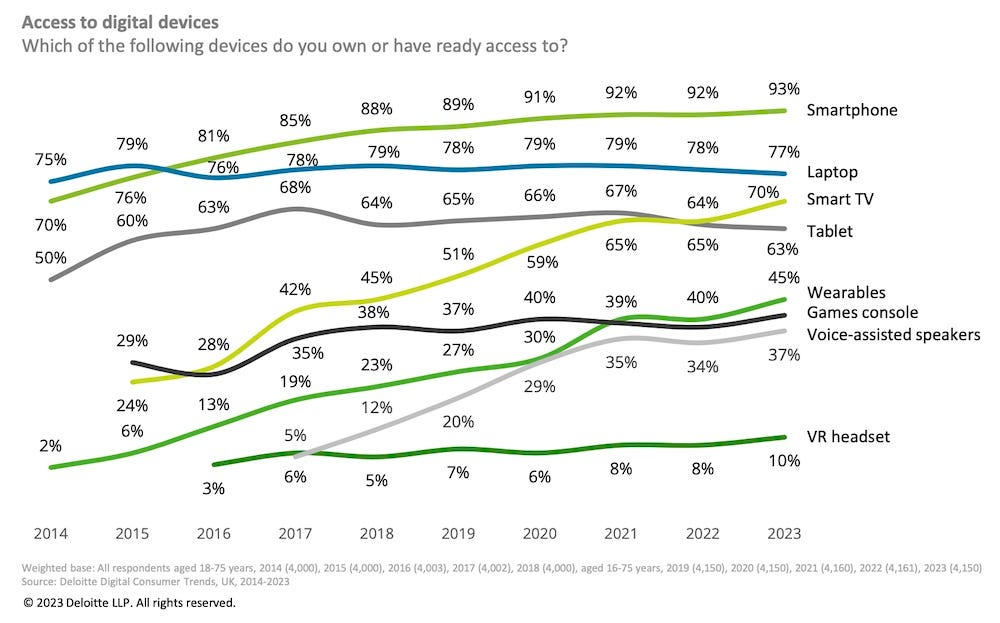
After this ‘news-hyperactive’ week - wow, Unity - let’s finish things off with some of the most notable game discovery and platform news that popped up recently:
It’s Steam’s 20th anniversary (!), and Valve is celebrating it with a specially themed sale: “Valve launched Steam on September 12, 2003, and we're super proud and incredibly grateful for what we've been able to do in the 20 years since.” Lots of cute milestones - and deals in there. And disturbing fake Halloween costumes.
Nintendo things: as interviewed by the Washington Post, Nintendo of America’s Doug Bowser is re-pitching that the company isn’t just about games any more: “We’re actually evolving into being an entertainment company with gaming as a nucleus of the overall business model.” Luckily for us game-heads, there’s a Nintendo Direct on Sept 14th at 7am PT, announced with traditional (and weird!) late notice.
As noted by Tim Schafer: “Day of the Devs is adding a NEW LIVE SHOW in Los Angeles this year [alongside The Game Awards], and moving the San Francisco live show to an earlier date in the year... Along with the Summer Games Showcase digital show, there are now THREE Day of the Devs shows per year to enjoy!” We will now be referring to this December timeframe as ‘The Keigh(ley)-mare Before Xmas’.
Some great research by Horace Dediu into the different economics between the iOS and Android customer. Turns out “the iPhone customer is 7.4 times more valuable than the Android customer” in terms of overall spending on a per-month basis: “Apple has effectively grown and discriminated customers effectively. It obtained not just 1 billion customers but the best 1 billion customers.”
Look, Valve has announced that“Indonesian [is] Steam’s 29th core language to be added to the desktop client, store, community, and mobile app.” Niko Partners also has a new article about why Indonesia is a big (278 million people!) and increasingly relevant game market - keep an eye on it.
More granular game hardware data for the UK in August 2023, via GfK and GI.biz: “PlayStation 5 posted a 42% jump in sales month-on-month.. [it] benefited substantially from aggressive price discounting and bundles across the summer months.” PS5 sales are up 60% YTD. Switch “dropped 5% month-on-month during August, while overall the console's sales are down 10% year-to-date.” (And Xbox is up marginally, but “trails Switch and PS5, and sales are down nearly 23% year-to-date.”)
Interesting to see the Football Manager franchise jumping from Apple Arcade (last year) to Netflix (this year) for the iOS and Android versions - the only way you can play it on mobile will be with a Netflix logon. (Large but niche franchises like this are definitely benefiting from the ‘subscription wars’.)
There’s a new Deloitte ‘digital consumer trends’ survey of UK folks aged 18-75 [.PDF link], and besides showing very gradual VR headset adoption & game console penetration in the 40% range, we see that 36% of respondents played a console in the last day (decent!), and 18% of them have a digital subscription related to games (whether it be Apple Arcade, Xbox/PS, Minecraft, etc...)
Apple is pitching the iPhone 15 Pro and iPhone 15 Pro Max for mobile games, picking up some high-profile games debuting soon: “Resident Evil Village, Resident Evil 4, and Death Stranding are coming to iPhone 15 Pro and iPhone 15 Pro Max later this year. Assassin’s Creed Mirage will be available in the first half of 2024.” (Not a game-changer yet, but over time, there’s aspirations there?)
Microlinks: Japanese YouTuber gets suspended jail sentence and fine for posting game footage; GDC 2024 is accepting submissions for the 26th annual Independent Games Festival until October 11th; Xbox’s September update allows you to stream games from Xbox to Discord, among other things.
Finally, you may or may not know that Nintendo - for recruitment purposes - creates company guides for potential Japanese employees. A few of these have been scanned in, and RJStar just now uploaded the 2022 ‘passport’ book, which is, well, adorable:
[We’re GameDiscoverCo, an agency based around one simple issue: how do players find, buy and enjoy your PC or console game? We run the newsletter you’re reading, and provide consulting services for publishers, funds, and other smart game industry folks.]
